How to Notarize a Document The Right Way
- WebsiteFix Technical Partner
- Jul 17, 2025
- 16 min read
Getting a document notarized might seem like a daunting legal formality, but it's really just a straightforward way to prevent fraud. At its core, the process involves having a state-appointed official—a Notary Public—witness your signature. This simple act adds a powerful layer of trust and legal integrity to important documents.
Think of a notary as an impartial, official witness. Their role isn't to read or approve what's in your document, but to confirm two critical things: that you are who you claim to be, and that you're signing the document willingly. That's it. This verification is what makes notarization so essential for everything from real estate deals to power of attorney forms.
Your Guide to Getting Documents Notarized
So, what does this process actually look like? It all comes down to a few key stages. Once you understand the flow, you'll see it’s a simple path designed to protect everyone involved.
The entire journey can be broken down into a few essential steps. You'll need to get your paperwork ready, find a qualified notary, prove your identity, and then complete the signing.
A High-Level Overview of the Process
Let's walk through what you can expect from start to finish. Knowing these steps ahead of time will help you avoid common pitfalls that can cause frustrating delays.
Preparing Your Document: The first thing is to make sure your document is 100% complete. Fill in all the necessary information, but leave the signature and date lines blank. This is the golden rule of notarization: do not sign it beforehand!
Verifying Your Identity: This part is non-negotiable. You’ll need a valid, unexpired, government-issued photo ID. A driver's license, state ID card, or passport are the most common options.
Finding a Notary: You've got options. Many banks, shipping stores (like The UPS Store), and law offices have notaries on staff. For more convenience, you can also use a mobile notary who comes to you or an online service for a remote session.
The Notarization Itself: During the appointment, the notary will watch you sign the document. Depending on the document type, they might also administer an oath. Finally, they will complete their official certificate, add their signature, and affix their seal or stamp.
A point that often trips people up is thinking the notary is legally reviewing the document. They aren't. Their entire focus is on the signature—confirming your identity and your willingness to sign. The contents of the agreement are your responsibility.
For instance, getting a sworn statement or an affidavit notarized requires a specific act called a jurat, where you swear or affirm the contents are true. Other documents, like a deed, might only need an acknowledgment, where you simply confirm that the signature is yours. Knowing which one you need is important, and looking at different affidavit notary sample templates for 2025 can show you exactly how these forms are structured.
To help you keep everything straight, here’s a quick checklist summarizing the key steps.
At-a-Glance Notarization Checklist
This table breaks down the process into simple, actionable phases so you can be fully prepared for your appointment.
Phase | Key Action | Crucial Tip |
|---|---|---|
Preparation | Fill out the entire document, leaving no blanks. | Do NOT sign or date the document until you are with the notary. |
Identification | Locate your valid, unexpired government photo ID. | Check the expiration date. An expired ID is the #1 reason for a refused notarization. |
Appointment | Find a notary and schedule an in-person or online meeting. | Bring your document, ID, and an accepted form of payment for the notary's fee. |
Execution | Sign the document in the notary's presence. | Listen carefully to the notary's instructions, especially if an oath is required. |
Completion | The notary completes the certificate, signs, and seals it. | Before you leave, glance over the notarial certificate to ensure your name is spelled correctly. |
Following these steps will ensure a smooth and successful notarization every time, giving your documents the legal standing they require.
Prepping Your Documents for a Smooth Notarization
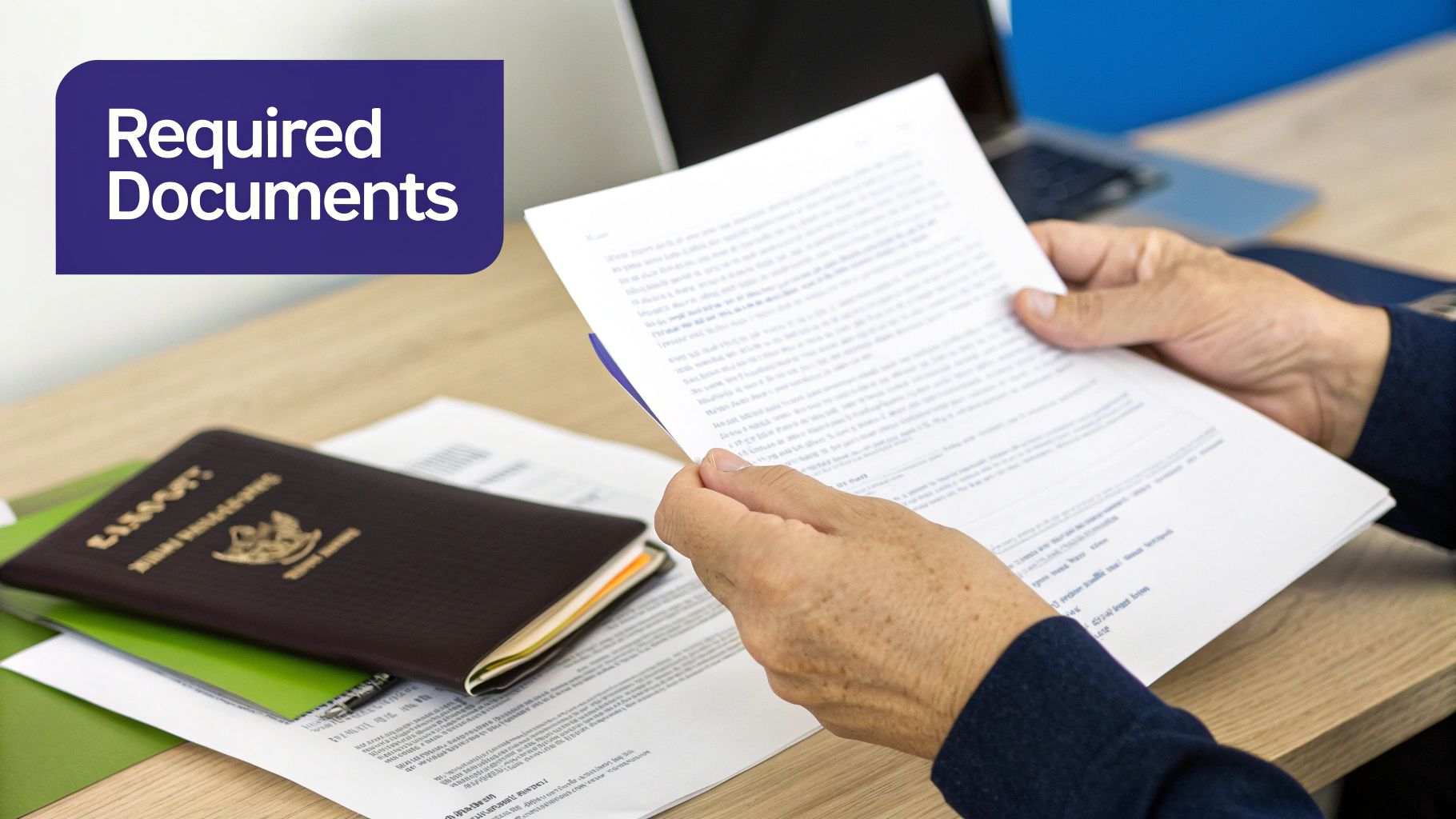
The secret to a quick, painless notarization isn't some complicated trick. It almost always comes down to good preparation. What you do before you ever meet the notary can make the difference between a five-minute signing and a frustrating rejection that sends you back to square one.
If you take away only one thing, let it be this: do not sign or date your document beforehand. This is the single most common mistake I see, and it’s an instant deal-breaker. The whole point of notarization is for the notary to witness you signing the document, whether that’s in person or on a live video call.
Signing it ahead of time, even just minutes before the appointment, invalidates the entire process. You’ll have to print a fresh copy and start over. Think of the notary as an official witness to the act of you signing. If they didn't see it, they can't legally vouch for it. A premature signature is a guaranteed showstopper.
Ensure Your Document Is 100% Complete
Beyond the signature line, every other part of your document needs to be filled out. A notary is legally required in most states to refuse service if the document has glaring blank spaces or is clearly incomplete.
Why is this a big deal? An empty field could be filled in after the notarization, completely changing the document's meaning. Imagine a loan agreement is notarized but the loan amount is left blank. Someone could easily write in a much higher number later, and your notarized signature would appear to approve it.
Before your appointment, do a thorough final review. Make sure you’ve filled in all the necessary details:
The full, correct names of everyone involved
Any relevant dates (just not the signature date!)
Addresses and contact information
Specific dollar amounts, terms, or other conditions
The only things left blank should be the signature and date lines meant for the actual signing. Nailing this step protects the document’s integrity and prevents major headaches down the road.
Understand What You Are Signing
While a notary can't give you legal advice or interpret the document for you, they do have a responsibility to make sure you're a willing and aware signer. If you seem confused, uncertain, or like you're being forced to sign, a professional notary will stop the session immediately.
Take the time to actually read what you're signing. If it’s a power of attorney, be crystal clear on what powers you’re granting and to whom. If it’s an affidavit, know exactly what statement you are swearing is true.
A notary's job includes screening for the signer's awareness and willingness. They might ask simple, non-legal questions like, “Do you understand the nature of this document?” or “Are you signing this of your own free will?” A confident "yes" tells them you’re a knowledgeable participant.
This isn’t just about making the notary's job easier; it's about protecting yourself.
Locate the Notarial Certificate
Take a look at your document, usually near where you'll sign, and you should see a block of text with specific notarial wording. This is the notarial certificate. It’s for the notary to complete, not you.
It’s a good idea to find this section ahead of time. You’ll generally see one of two types:
Acknowledgment: This wording is used when you simply need to confirm that you appeared before the notary and acknowledged signing the document willingly. It’s common for deeds, contracts, and business agreements.
Jurat: This certificate is for sworn statements. It contains language where you must swear or affirm that the contents of the document are true. You’ll find this on affidavits and depositions.
What if your document doesn't have one? The notary can attach a separate page, called a "loose certificate." However, they can't choose which type you need. You'll have to tell them whether it requires an acknowledgment or a jurat. If you're not sure, check with the agency or person who asked you to get the document notarized. Getting all these details sorted out beforehand is what sets you up for a flawless and efficient notarization.
Navigating Notary Identification Requirements
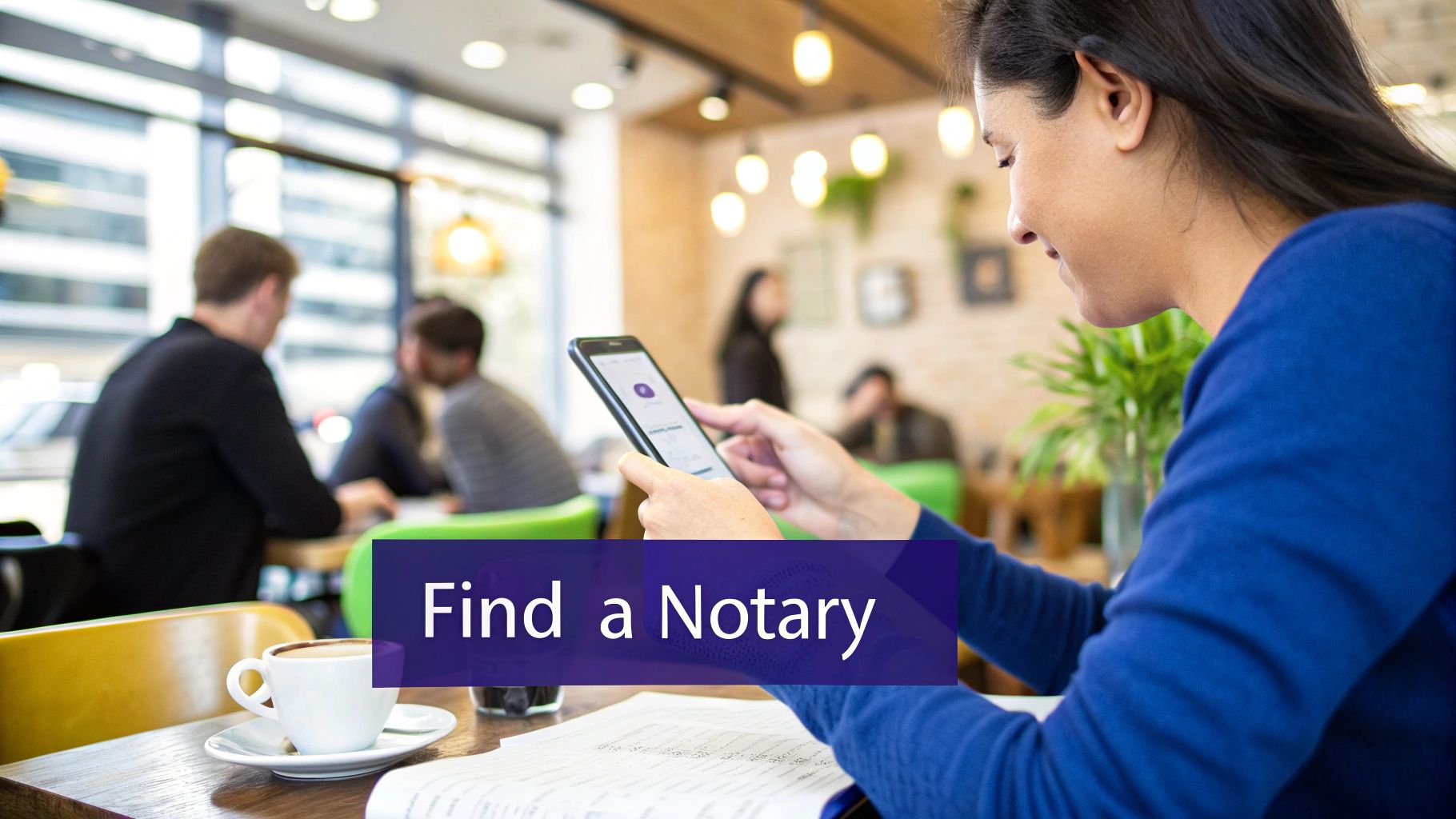
Let's get straight to the point: proving your identity is the single most critical part of any notarization. Without it, the whole process is invalid. This is where people often get tripped up, because what counts as "ID" can vary a bit from state to state. We'll walk through exactly what you need to have ready.
A notary's main job, above all else, is to confirm you are who you claim to be. This is the crucial step that prevents fraud and gives the document its legal weight. Because of this, you can't just pull any old card out of your wallet.
What Makes an ID Acceptable for Notarization
When you're heading to your appointment, whether in person or online, the notary is looking for a very specific type of identification. It has to tick a few boxes to be legally acceptable.
For an ID to pass muster, it must be:
Current or recently expired: This is a big one. Most states demand a current, unexpired ID. A few, however, are more lenient and might accept one that expired within the last three years. My advice? Always bring a current one if you can. It avoids any gray areas.
Government-issued: The ID absolutely has to come from a state or federal government agency. No exceptions here.
Photo-bearing: A clear photograph is essential so the notary can visually match you to the ID.
Contain a physical description: Details like your height, weight, and eye color provide another layer of confirmation.
Include your signature: The notary will compare the signature on your ID with the one you're about to put on the document.
In practice, the go-to documents are a state-issued driver's license, a non-driver state ID card, a U.S. passport, or a U.S. military ID. Stick with one of those, and you’ll be in good shape.
Things like your Social Security card, a credit card with your photo, or even a birth certificate won't work. They’re important, sure, but they don't have that magic combination of a photo, physical description, and signature that a notary is legally required to check.
Keep this in mind: A notary’s decision to accept or reject an ID isn't personal. It's dictated by state law. If your ID doesn't meet the legal standard, they must refuse the notarization to protect their commission and the integrity of the act.
Handling Common ID Challenges
Life happens. Maybe your ID expired last week, or the name on your document doesn't perfectly match your license. I've seen it all. These are common bumps in the road, but they don't have to derail the whole process.
Let's break down a couple of real-world scenarios.
Minor Name Discrepancies: What if your document lists "William Jones," but your ID says "Bill Jones"? Most notaries can move forward with that, as "Bill" is a common derivative of "William." But if the document says "William A. Jones" and your ID is for "William B. Smith," that's a hard stop. The name on the ID has to substantially match the one on the document.
Recently Expired ID: As I mentioned, some states have a grace period. If you find yourself in this situation, the best thing to do is check your state's notary laws or, even better, call the notary service ahead of time to confirm. When in doubt, just get your ID renewed. It's the safest bet.
No Valid ID at All: So you lost your wallet, or you just don't have a government-issued photo ID. You're not totally stuck. The most common workaround is to use credible identifying witnesses.
The Credible Witness Solution
Think of a credible witness as a human ID card. This is a person who knows you well and is willing to swear to your identity under oath in front of the notary.
The rules for using a credible witness change slightly depending on the state, but the general principles are the same:
The witness has to personally know you, the signer.
The witness can't be named in the document or have any financial stake in the transaction. This is key for impartiality.
The witness must have their own valid, government-issued photo ID to present to the notary.
In many states, you'll need one credible witness if that person is also personally known by the notary. If the notary doesn't know your witness, you'll likely need two credible witnesses. They will sign the notary’s journal and may have to sign a sworn statement confirming your identity. It's a solid backup plan that ensures you can still get your documents notarized even when you don't have the usual ID.
In-Person vs. Online: Choosing Your Notarization Method
With your documents prepped and your ID in hand, you've reached a fork in the road. Do you go the traditional route and meet a notary in person, or do you embrace technology and get it done online? This choice directly impacts how quickly, easily, and affordably you can get that official seal. Let's walk through both paths so you can figure out what makes the most sense for you.
For centuries, notarization meant one thing: a face-to-face meeting with a Notary Public. It's a reliable, time-tested process. The modern alternative, Remote Online Notarization (RON), lets you accomplish the same task from anywhere using a secure video connection.
The Classic In-Person Approach
When you opt for an in-person notarization, you have a few go-to options. Many local banks and credit unions, like KeyBank, offer notary services, sometimes even for free if you're a customer. A quick pro tip: always call your branch ahead of time. You'll want to confirm a notary is actually working that day and find out their hours, which are usually limited to a standard 9-to-5 window.
Shipping centers like The UPS Store are another solid bet. They almost always have a notary available, which is a huge plus if you also need to ship your freshly notarized document.
For ultimate convenience, especially for high-stakes signings like real estate closings, you can hire a mobile notary. These professionals come directly to you—your home, your office, a coffee shop—offering a level of flexibility a brick-and-mortar location simply can't.
No matter where you go, the in-person process follows a familiar script. This visual breaks down the core steps you'll go through.
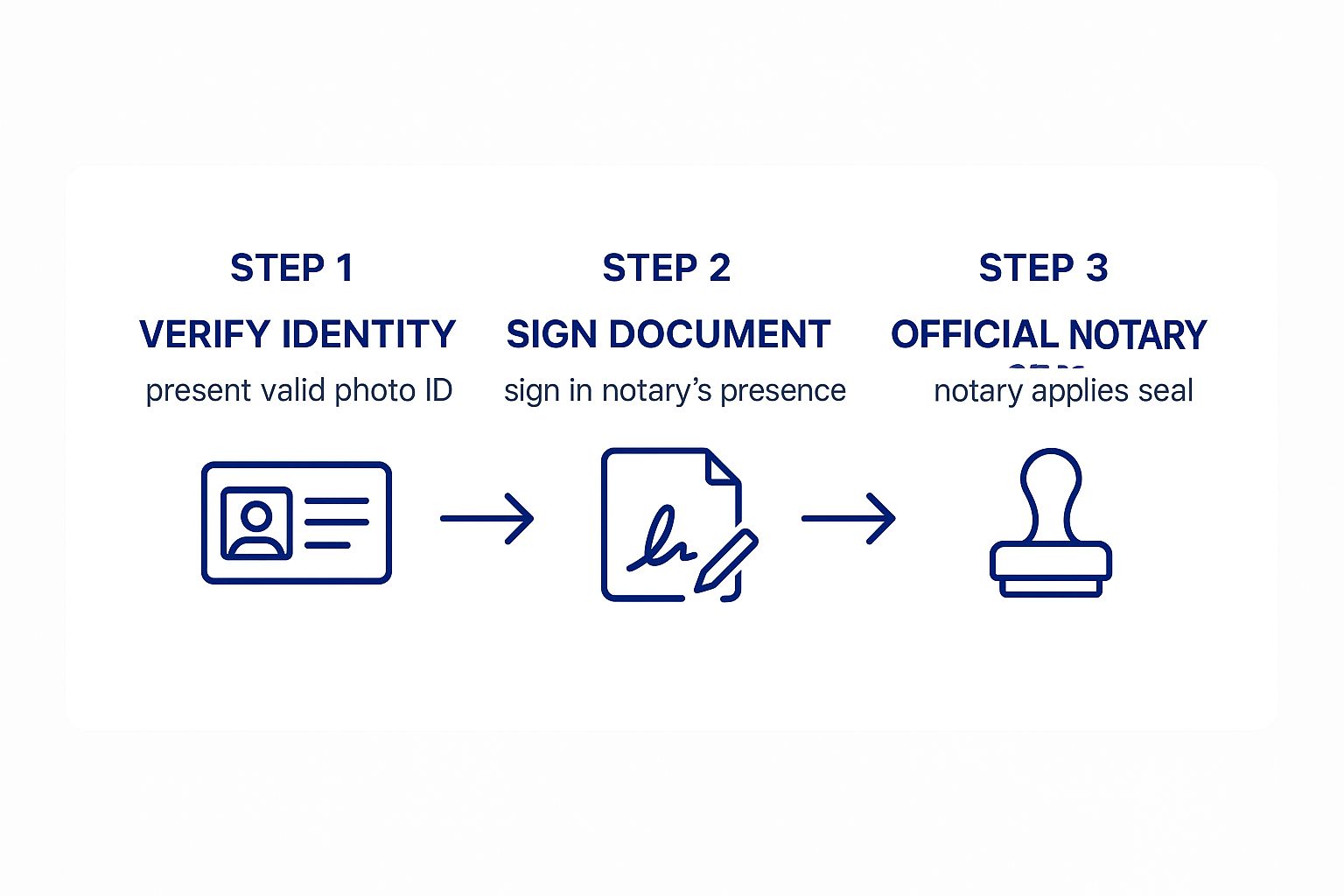
As you can see, it all hinges on physical presence. The notary must see you, check your ID with their own eyes, watch you sign the paper, and then apply their ink stamp or embosser.
The Modern Alternative: Remote Online Notarization
Remote Online Notarization (RON) is a game-changer. Instead of driving somewhere, you connect with a state-commissioned online notary through a live, two-way audio-video call. It's an ideal solution if you're juggling a packed schedule, have mobility challenges, or simply need a document notarized right now.
The fundamental principles—verifying your identity and ensuring you sign willingly—are exactly the same as the in-person method. The difference is that RON uses sophisticated digital tools to get the job done. You just upload your document, pass a secure identity check, and e-sign while the notary watches on screen.
This tech-forward approach is catching on fast. The RON market, valued at around USD 500 million in 2025, is expected to grow by over 20% each year, potentially hitting USD 2 billion by 2033. What’s driving this? The boom in remote work, broader acceptance of e-signatures, and the simple fact that most U.S. states now legally recognize RON.
How to Choose the Right Method for You
So, which way should you go? The best choice comes down to balancing four things: convenience, speed, cost, and security. To make it easier, here’s a side-by-side look.
Factor | In-Person Notarization | Remote Online Notarization (RON) |
|---|---|---|
Convenience | Requires travel to a physical location during business hours. A mobile notary adds flexibility but costs more. | Extremely high. Handle it from anywhere with an internet connection, often 24/7. Zero travel required. |
Speed | Can be fast with an appointment, but walk-ins can mean long waits. The process is tied to travel and availability. | Very fast. A typical session, from login to downloading your final document, can be done in just 10-15 minutes. |
Cost | Fees are usually set by the state (often $5-$15 per signature). Mobile notaries charge an extra travel fee. | Generally costs more per notarization (starting around $25) but saves you time and travel expenses. |
Security | Relies on the notary’s visual check of physical IDs and a wet-ink signature. It's secure but open to human error. | Uses multi-layered identity verification, including credential analysis and knowledge-based questions. |
If you have a simple document, aren't in a rush, and happen to be near your bank, the traditional in-person method is a perfectly fine choice. But for urgent needs, complex transactions, or if you simply value your time, RON is often the better, more efficient option.
If you’re leaning toward the digital route, take a closer look at these secure and convenient remote online notary services to see just how streamlined the process can be.
The Tech Behind Digital Notarization and E-Notary Software
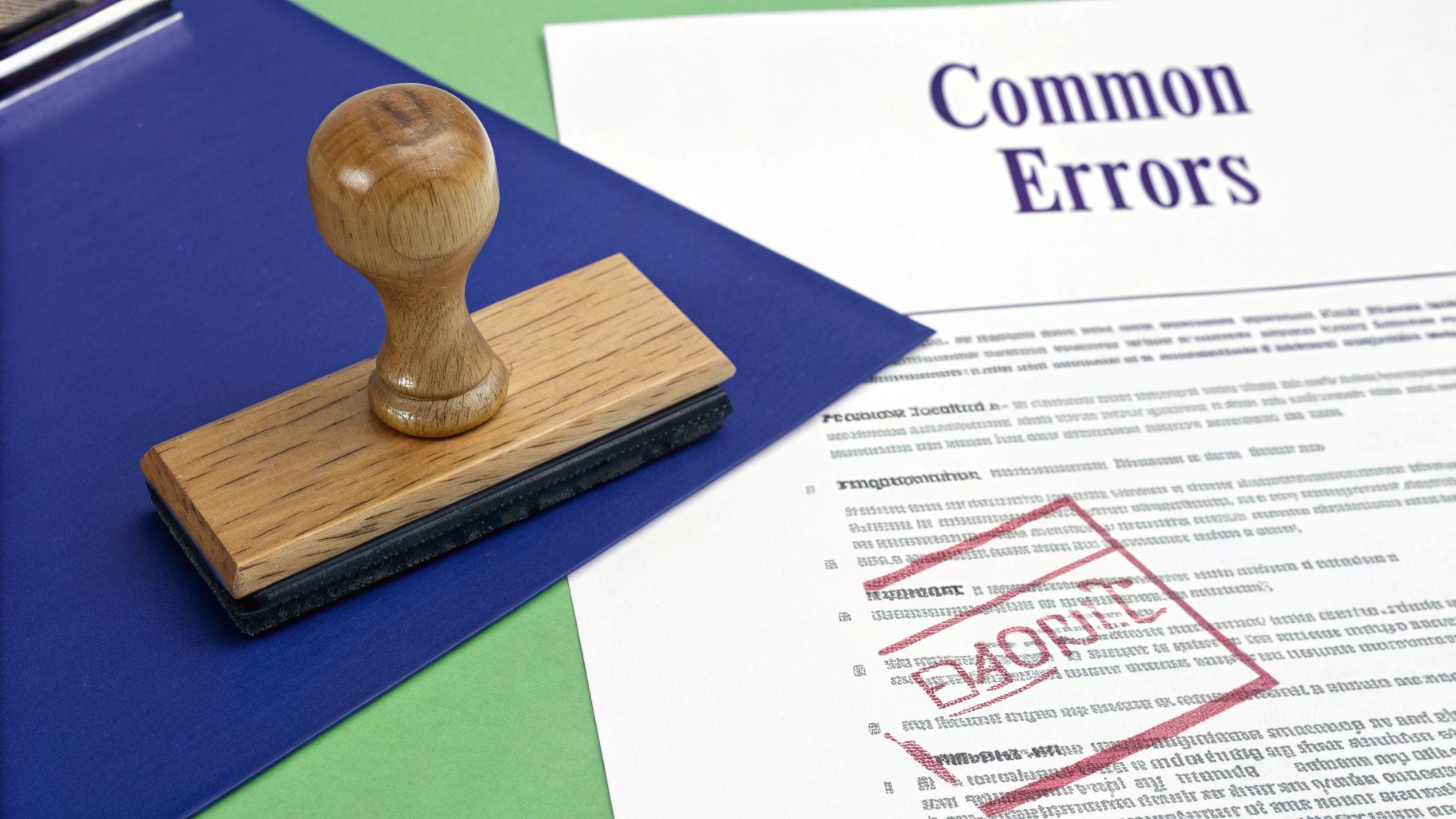
The digital age has completely reshaped how we handle official documents, taking notarization from a purely physical act to a secure, online process. This whole shift is made possible by sophisticated e-notary software, which acts as a digital version of a notary’s office, journal, and seal all rolled into one. These platforms are the engines that power the entire Remote Online Notarization (RON) experience.
At its core, e-notary software is a secure, cloud-based platform that connects you with a commissioned notary public through a live, two-way audio-video feed. Think of it as a super-secure video call built specifically for legal transactions. But it’s much more than just a camera and microphone; the platform layers in several technologies to meet strict legal standards and protect everyone from fraud.
This isn’t your average video chat. The software orchestrates every single step, from the moment you upload your document to the final, tamper-evident seal. It’s this powerful combination of features that makes online notarization not just a convenience, but a remarkably secure alternative.
Core Components of E-Notary Platforms
To really grasp how these platforms operate, you have to look under the hood at their key technologies. Every feature has a specific job, all working together to ensure the transaction is legally sound and secure from start to finish. In many ways, this multi-layered approach provides far more security than a traditional, in-person signing.
The entire system is designed to verify, record, and protect every part of the transaction. Here’s a peek at what’s working behind the scenes:
Identity Verification and Credential Analysis: Before you even say hello to the notary, the software uses powerful tools to confirm you are who you say you are. You’ll usually be asked to snap a photo of your government-issued ID, which an AI system then analyzes for authenticity, checking for holograms, microprint, and other security features to spot fakes.
Knowledge-Based Authentication (KBA): For an added layer of security, you'll likely face a series of multiple-choice questions pulled from your personal credit and public records. Think questions like, "Which of these streets have you lived on?" These are tough for an imposter to guess correctly.
Secure Audio-Video Link: The live connection between you and the notary is always encrypted and recorded. This recording becomes irrefutable proof of the notarization, capturing the entire interaction for legal and audit purposes.
Electronic and Digital Signatures: Once your identity is confirmed, you'll apply an e-signature to the document. The notary then attaches their own digital signature—a more advanced, encrypted signature that cryptographically binds their identity to the document and creates a tamper-evident seal.
This robust framework of checks and balances is what gives online notarization its legal weight and trustworthiness.
The Role of E-Signatures and Market Growth
The entire e-notary ecosystem is built on the foundation of e-signature technology. It was the widespread acceptance of electronic signing for business contracts and personal agreements that paved the way for its use in notarization. And this trend isn't slowing down.
The e-notary software market, valued at around USD 262 million in 2025, is projected to skyrocket to nearly USD 798 million by 2037. This explosive growth is directly tied to the incredible efficiency e-signatures bring to the table—some studies have even linked them to an 89% reduction in project timelines. You can dive deeper into the numbers by checking out more market insights about e-notary software on Research Nester.
At Signature on Demand, we bring these powerful technologies together to create a smooth, secure experience. Our platform relies on these advanced security protocols to ensure every remote notarization is fully compliant and protected, giving you total peace of mind, whether you're signing a quitclaim deed or a power of attorney.
Ensuring Document Integrity and Security
One of the biggest wins for digital notarization is how it safeguards the final document. Once the signing is over, the platform applies a digital certificate that essentially locks the document down.
This certificate acts like a digital fingerprint. If anyone tries to alter the document—even by changing a single letter—the certificate will instantly show that it has been tampered with. This creates a clear, auditable trail that's far more difficult to forge than a traditional ink stamp on paper. The video recording and the tamper-evident seal work together to create a powerful security duo, validating the integrity of your document long after the session has ended.
Got Questions? Let's Clear Things Up.
Even after you've got your documents and ID ready, a few questions might still pop up. That's perfectly normal. Notarization has its own language and set of rules, and it’s easy to get tangled up in the details.
Let's walk through some of the most common questions I hear from clients. My goal is to give you the clarity and confidence you need to get this done right.
What’s the Difference Between an Acknowledgment and a Jurat?
This is probably the number one question people ask. They sound similar, but an acknowledgment and a jurat serve two very different functions. It’s crucial to know which one you need.
An acknowledgment is all about verifying identity and a signature. Think of it as you "acknowledging" to the notary, "Yes, that's my signature, and I signed this document willingly." The notary isn't concerned with the content of the document, only that you are who you say you are and signed it yourself.
A jurat, on the other hand, requires you to swear or affirm that the contents of the document are true. For this one, you absolutely must sign in front of the notary. It adds a layer of legal weight and is typically used for things like affidavits or other sworn statements where you’re attesting to the truthfulness of the information.
So, how do you know which one to get? The document itself should tell you. The notarial certificate wording will specify either an acknowledgment or a jurat. A notary cannot make this choice for you—that would be considered giving legal advice, which we are prohibited from doing. If you're unsure, you have to go back to the person or agency that asked for the notarization and get clarification from them.
Can a Notary Refuse to Notarize My Document?
Yes, absolutely. In fact, under certain conditions, we are legally required to refuse. A good notary’s job isn't just to stamp paper; it's to act as a gatekeeper against fraud. Don't take it personally—it's about protecting everyone involved.
A notary must say no if:
You can't be properly identified. If your ID is expired (and you're past your state's grace period) or it doesn't meet the legal requirements, the process stops there.
You seem unaware or are being forced to sign. If a signer appears confused, doesn't understand the document, or if it looks like someone is pressuring them, a responsible notary will halt the notarization immediately.
The document is incomplete. A notary can never notarize a document with blank spaces or missing information. This prevents someone from fraudulently filling in the blanks later.
The notary has a personal stake in the deal. If the notary stands to gain financially from the transaction, they have a conflict of interest and cannot be impartial.
A refusal isn’t a failure. It’s proof that the system is working as intended.
For Online Notarization, Do I Need to Be in the Same State as the Notary?
This is a huge point of confusion with Remote Online Notarization (RON), but the answer is usually great news for the signer: no. In most cases, you can be physically located just about anywhere in the world for your online session.
The critical rule is about the notary's location, not yours. The online notary must be physically present in the state where they hold their commission. As the signer, your location is typically flexible, which is what makes RON so powerful for people doing business internationally, traveling, or living abroad.
Of course, there's always a "but." Before you assume you're good to go, it's smart to double-check with the agency or organization that will be receiving your document. While the law in the notary's state might allow for out-of-state signers, a specific company or government office might have its own internal policies.
This flexibility is a huge reason the digital legal space is growing so quickly. In fact, supportive government regulations and widespread digital adoption are fueling a major expansion of the global online notary market. Research projects a strong compound annual growth rate for the market through 2033, showing just how much things are shifting. You can discover insights on the online notary market growth on Archive Market Research.
And before you finalize everything, especially for a big transaction, it’s always wise to know what you'll be paying. For a full breakdown, take a look at our guide on the real cost of notarizing a document explained.




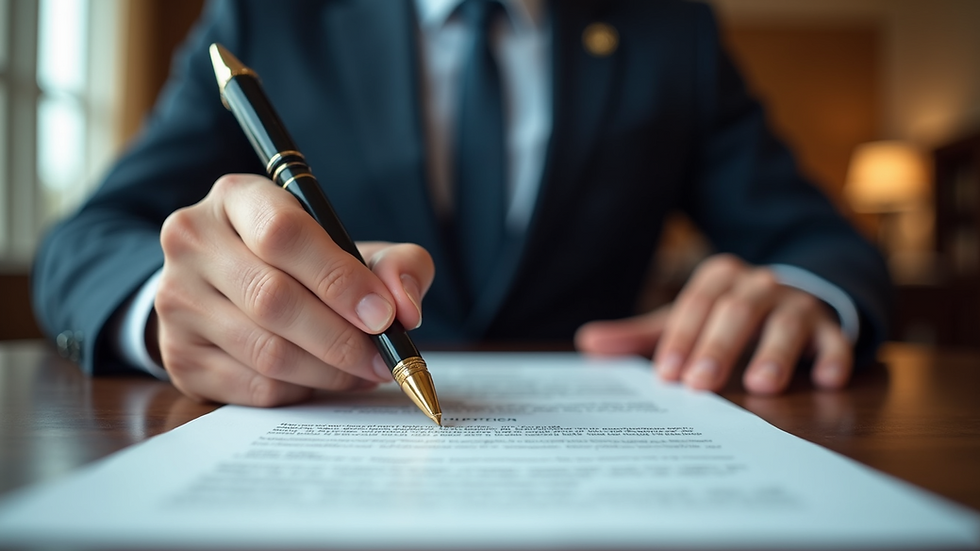


Comments